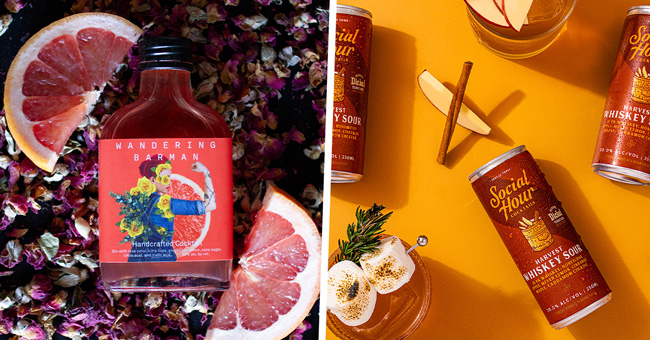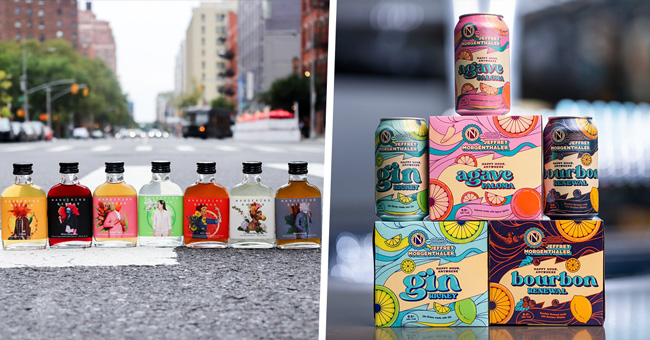
As beverage director of New York’s acclaimed Clover Club, Tom Macy had tossed around the idea of a canned craft cocktail since 2013. But the concept didn’t truly lift off until February 2020 when he and his boss, Julie Reiner, finished their pitch deck for Social Hour Cocktails, a ready-to-drink high quality cocktail. By the time they had a finished product, it faced some considerable competition.
“COVID-19 of course poured gasoline on the category and so by the time we forced it out the door in August, everything was different,” Macy said.
Macy and Reiner aren’t the only big bar names looking to capture their skills in a can. Other bartenders are also trying to find the right niche and messaging as they now vie for shelf space in the fastest growing spirits category.
The variations range. In 2020, seasoned L.A.-based bartender Aaron Polsky launched LiveWire Drinks, a rockstar-styled brand canning his cocktails as well as those from his mixology peers. Just before the pandemic, Los Angeles bar veteran Hope Ewig founded Vervet, a line of farm-to-can sparkling cocktails. Even the Noma alumni at Empirical Spirits have joined in, canning ingredients like oolong tea and green gooseberry into a genre-defying 10% ABV beverage.
From the Bar to the Can
Understanding how to perfect cocktails behind the bar has given some founders a natural advantage in formulation. After starting with a flavor house, Macy now has a grip on the process and tinkers with new product ideas himself instead of outsourcing. The company has launched seven expressions, from takes on whiskey mules and sours to spritz expressions, most of which hover from 8% to 11% ABV.
Some have built on their reputations or longtime industry relationships, fueling unique releases. Social House was approached for a collaborative cocktail by George Dickel Whiskey, owned by Diageo, and produced a premium 20% ABV seasonal whiskey sour that they’ll release for a second time this fall.
“I think the fact that a company our size and so early on was able to do this collaboration with someone owned by Diageo just speaks to just how much exploration and creativity there is in the category, and the immaturity of the category,” he said.
Eugene-based Ninkasi Brewing also tapped an industry veteran to partner with on its canned cocktails, which launched last year. A decades-long friendship between Ninkasi’s owner and seven-time James Beard-nominated bartender Jeffrey Morgenthaler led to the pandemic project, combining the two parties’ respective expertise in canned beverages and mixology. Like other brewers, Ninkasi has leveraged its production capacity to reach new audiences with non beer offerings, including a hard seltzer in 2019. The cocktails were a natural next step, especially after the pandemic’s hit to the brewery.

“I just didn’t want to partner with these guys to produce poor renditions of great cocktails, which I felt like a lot of places were doing and, of course, I knew that they would go for that idea because they’ve always been at the cutting edge of brewing and super innovative,” said Morgenthaler.
The cocktails, introduced last February, come in six flavors and are distributed across the Pacific Northwest, Idaho, Nevada and California. One of them, the Bourbon Renewal, is a reimagined version of Morgenthaler’s classic at Portland’s Clyde Common, which closed due to the pandemic.
He has since opened a new bar, Pacific Standard, in June 2022, but the canned drinks have established a long-term home for the celebrated bartender’s cocktails to live off-premise. His name scrawled across the cans has helped it appeal to some audiences, he said.
“I think that people who do know great cocktails have probably come across my work at some point,” he said. “With those people I feel the cocktails have resonated, whereas your average person that’s just looking for something delicious to drink has no idea who I am.’”
Finding an Audience
And as with other bartender-founded RTDs, it’s what’s inside the cans— real ingredients, top notch spirits, and a unique recipe — that may make these cocktails more appealing to a growing number of consumers. Spirits-based RTDs now account for 13% of market volume compared to 8% in 2021, and RTD innovations are increasingly driven by sustainability, full-flavor, and premiumization trends.
“From the beginning, I just wanted to do what we do behind the bar and put it in a can. I didn’t really think about that as being a differentiator,” said Macy. “I just thought this is the only way to make a cocktail.”
But capitalizing on the thirst for premium canned cocktails without a big budget or team can be challenging. Social Hour Cocktails has made inroads in off-premise locations in New York and New Jersey, and is slowly growing with Disney World, a major account for the tiny operation. Macy is hesitant to grow into new markets without more of a marketing budget.
New York-based Wandering Barman has found a different approach. The company was spun off from Yours Sincerely, a New York draft cocktail bar that specializes in pre-made, pourable drinks. Founded by Julian Mohamed, Darren Grenia and Roxane Mollicchi, the company first began bottling its concoctions to sell to other bars and restaurants before later making the leap to off-premise.
But its sweet spot is supplying on-premise locations that lack full bars. The cocktails are now distributed in eight states, and can be found at the company’s Brooklyn tasting room, where drinks like its marigold margarita and date-infused old fashioned are served on-tap alongside local beer and wine.
With double the cocktail expressions of Your Sincerely (which the founders are no longer affiliated with), the tasting room boosts brand recognition and serves as a space for research and development. But outside of New York, the founders are reliant on distributors to develop customer awareness and education, which can be challenging for a flask-sized, full strength cocktail designed to be poured over ice. They also miss getting instant feedback after sliding a glass across the bar.
“It would be nice to know who exactly consumes our drinks in other states so we can get a better picture of what we’re doing right,” said Mohamed.
That on-the-ground knowledge would be helpful as the company is currently developing custom products for venues, pushing to enter new states and countries, and brainstorming other product launches.
Crafting a Presence
As the RTD category matures, the makers of these bar-level cocktails are encouraged by the trends moving away from the first wave of hard seltzers to complex drinks.
“I think the category is actually an extension of the craft cocktail category and what we all set out to do,” said Morgenthaler. “Back in the day when we were all trying to make better cocktails, our thing was just to get more delicious drinks in the hands of more people.”
It’s true: bottled premium cocktails can now be found on airlines, in hotels, movie theaters and have been acquired by major beverage companies. But Macy wonders if the same people sliding up to the craft cocktail bar are also buying canned cocktails on-the-go.
“One thing that’s given me confidence is craft cocktail bars can be found in mid-level markets and even smaller markets, so there’s clearly an audience for it,” said Macy. “But I wonder how big that audience is and will they just be making them at home if not going out?”
The team behind Wandering Bartender is confident that they’re tapping into a generation that never got to experience the craft cocktail movement, and are just looking for a novel drinking experience.
“There’s a part of Gen Z that didn’t necessarily go out to get $20 or $15 cocktails at bars in the city,” said Mohamed. “So, I think there are people that went to the cocktail bars that would appreciate the cocktails we’re putting out there, but I think there are many people that consume our cocktails that have never experienced a fancy cocktail bar.”